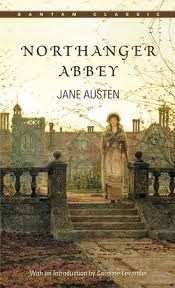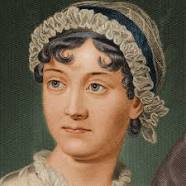Northanger Abbey Page #6
Northanger Abbey was the first of Jane Austen's novels to be completed for publication, in 1803. However, it was not published until after her death in 1817, along with another novel of hers, Persuasion.
Mrs. Thorpe was a widow, and not a very rich one; she was a good-humoured, well-meaning woman, and a very indulgent mother. Her eldest daughter had great personal beauty, and the younger ones, by pretending to be as handsome as their sister, imitating her air, and dressing in the same style, did very well. This brief account of the family is intended to supersede the necessity of a long and minute detail from Mrs. Thorpe herself, of her past adventures and sufferings, which might otherwise be expected to occupy the three or four following chapters; in which the worthlessness of lords and attorneys might be set forth, and conversations, which had passed twenty years before, be minutely repeated. CHAPTER 5 Catherine was not so much engaged at the theatre that evening, in returning the nods and smiles of Miss Thorpe, though they certainly claimed much of her leisure, as to forget to look with an inquiring eye for Mr. Tilney in every box which her eye could reach; but she looked in vain. Mr. Tilney was no fonder of the play than the pump-room. She hoped to be more fortunate the next day; and when her wishes for fine weather were answered by seeing a beautiful morning, she hardly felt a doubt of it; for a fine Sunday in Bath empties every house of its inhabitants, and all the world appears on such an occasion to walk about and tell their acquaintance what a charming day it is. As soon as divine service was over, the Thorpes and Allens eagerly joined each other; and after staying long enough in the pump-room to discover that the crowd was insupportable, and that there was not a genteel face to be seen, which everybody discovers every Sunday throughout the season, they hastened away to the Crescent, to breathe the fresh air of better company. Here Catherine and Isabella, arm in arm, again tasted the sweets of friendship in an unreserved conversation; they talked much, and with much enjoyment; but again was Catherine disappointed in her hope of reseeing her partner. He was nowhere to be met with; every search for him was equally unsuccessful, in morning lounges or evening assemblies; neither at the Upper nor Lower Rooms, at dressed or undressed balls, was he perceivable; nor among the walkers, the horsemen, or the curricle-drivers of the morning. His name was not in the pump-room book, and curiosity could do no more. He must be gone from Bath. Yet he had not mentioned that his stay would be so short! This sort of mysteriousness, which is always so becoming in a hero, threw a fresh grace in Catherine's imagination around his person and manners, and increased her anxiety to know more of him. From the Thorpes she could learn nothing, for they had been only two days in Bath before they met with Mrs. Allen. It was a subject, however, in which she often indulged with her fair friend, from whom she received every possible encouragement to continue to think of him; and his impression on her fancy was not suffered therefore to weaken. Isabella was very sure that he must be a charming young man, and was equally sure that he must have been delighted with her dear Catherine, and would therefore shortly return. She liked him the better for being a clergyman, “for she must confess herself very partial to the profession”; and something like a sigh escaped her as she said it. Perhaps Catherine was wrong in not demanding the cause of that gentle emotion--but she was not experienced enough in the finesse of love, or the duties of friendship, to know when delicate raillery was properly called for, or when a confidence should be forced. Mrs. Allen was now quite happy--quite satisfied with Bath. She had found some acquaintance, had been so lucky too as to find in them the family of a most worthy old friend; and, as the completion of good fortune, had found these friends by no means so expensively dressed as herself. Her daily expressions were no longer, “I wish we had some acquaintance in Bath!” They were changed into, “How glad I am we have met with Mrs. Thorpe!” and she was as eager in promoting the intercourse of the two families, as her young charge and Isabella themselves could be; never satisfied with the day unless she spent the chief of it by the side of Mrs. Thorpe, in what they called conversation, but in which there was scarcely ever any exchange of opinion, and not often any resemblance of subject, for Mrs. Thorpe talked chiefly of her children, and Mrs. Allen of her gowns. The progress of the friendship between Catherine and Isabella was quick as its beginning had been warm, and they passed so rapidly through every gradation of increasing tenderness that there was shortly no fresh proof of it to be given to their friends or themselves. They called each other by their Christian name, were always arm in arm when they walked, pinned up each other's train for the dance, and were not to be divided in the set; and if a rainy morning deprived them of other enjoyments, they were still resolute in meeting in defiance of wet and dirt, and shut themselves up, to read novels together. Yes, novels; for I will not adopt that ungenerous and impolitic custom so common with novel-writers, of degrading by their contemptuous censure the very performances, to the number of which they are themselves adding--joining with their greatest enemies in bestowing the harshest epithets on such works, and scarcely ever permitting them to be read by their own heroine, who, if she accidentally take up a novel, is sure to turn over its insipid pages with disgust. Alas! If the heroine of one novel be not patronized by the heroine of another, from whom can she expect protection and regard? I cannot approve of it. Let us leave it to the reviewers to abuse such effusions of fancy at their leisure, and over every new novel to talk in threadbare strains of the trash with which the press now groans. Let us not desert one another; we are an injured body. Although our productions have afforded more extensive and unaffected pleasure than those of any other literary corporation in the world, no species of composition has been so much decried. From pride, ignorance, or fashion, our foes are almost as many as our readers. And while the abilities of the nine-hundredth abridger of the History of England, or of the man who collects and publishes in a volume some dozen lines of Milton, Pope, and Prior, with a paper from the Spectator, and a chapter from Sterne, are eulogized by a thousand pens--there seems almost a general wish of decrying the capacity and undervaluing the labour of the novelist, and of slighting the performances which have only genius, wit, and taste to recommend them. “I am no novel-reader--I seldom look into novels--Do not imagine that I often read novels--It is really very well for a novel.”
Translation
Translate and read this book in other languages:
Select another language:
- - Select -
- 简体中文 (Chinese - Simplified)
- 繁體中文 (Chinese - Traditional)
- Español (Spanish)
- Esperanto (Esperanto)
- 日本語 (Japanese)
- Português (Portuguese)
- Deutsch (German)
- العربية (Arabic)
- Français (French)
- Русский (Russian)
- ಕನ್ನಡ (Kannada)
- 한국어 (Korean)
- עברית (Hebrew)
- Gaeilge (Irish)
- Українська (Ukrainian)
- اردو (Urdu)
- Magyar (Hungarian)
- मानक हिन्दी (Hindi)
- Indonesia (Indonesian)
- Italiano (Italian)
- தமிழ் (Tamil)
- Türkçe (Turkish)
- తెలుగు (Telugu)
- ภาษาไทย (Thai)
- Tiếng Việt (Vietnamese)
- Čeština (Czech)
- Polski (Polish)
- Bahasa Indonesia (Indonesian)
- Românește (Romanian)
- Nederlands (Dutch)
- Ελληνικά (Greek)
- Latinum (Latin)
- Svenska (Swedish)
- Dansk (Danish)
- Suomi (Finnish)
- فارسی (Persian)
- ייִדיש (Yiddish)
- հայերեն (Armenian)
- Norsk (Norwegian)
- English (English)
Citation
Use the citation below to add this book to your bibliography:
Style:MLAChicagoAPA
"Northanger Abbey Books." Literature.com. STANDS4 LLC, 2025. Web. 23 Feb. 2025. <https://www.literature.com/book/northanger_abbey_45>.








Discuss this Northanger Abbey book with the community:
Report Comment
We're doing our best to make sure our content is useful, accurate and safe.
If by any chance you spot an inappropriate comment while navigating through our website please use this form to let us know, and we'll take care of it shortly.
Attachment
You need to be logged in to favorite.
Log In